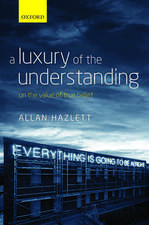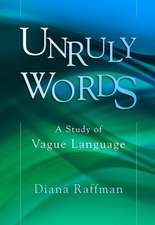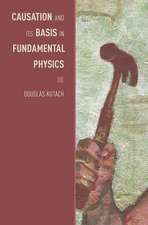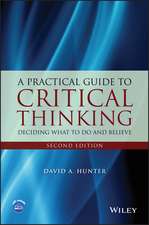Moral Epistemology: New Problems of Philosophy
Autor Aaron Zimmermanen Limba Engleză Paperback – 19 mai 2010
In this outstanding introduction to the subject Aaron Zimmerman covers the following key topics:
- What is moral epistemology? What are its methods? Including a discussion of Socrates, Gettier and contemporary theories of knowledge
- skepticism about moral knowledge based on the anthropological record of deep and persistent moral disagreement, including contextualism
- moral nihilism, including debates concerning God and morality and the relation between moral knowledge and our motives and reasons to act morally
- epistemic moral scepticism, intuitionism and the possibility of inferring ‘ought’ from ‘is,’ discussing the views of Locke, Hume, Kant, Ross, Audi, Thomson, Harman, Sturgeon and many others
- how children acquire moral concepts and become more reliable judges
- criticisms of those who would reduce moral knowledge to value-neutral knowledge or attempt to replace moral belief with emotion.
Including chapter summaries and annotated further reading at the end of each chapter, Moral Epistemology is essential reading for all students of ethics, epistemology and moral psychology.
| Toate formatele și edițiile | Preț | Express |
|---|---|---|
| Paperback (1) | 391.65 lei 6-8 săpt. | |
| Taylor & Francis – 19 mai 2010 | 391.65 lei 6-8 săpt. | |
| Hardback (1) | 1006.43 lei 6-8 săpt. | |
| Taylor & Francis – 21 mai 2010 | 1006.43 lei 6-8 săpt. |
Din seria New Problems of Philosophy
-
 Preț: 280.51 lei
Preț: 280.51 lei -
 Preț: 282.83 lei
Preț: 282.83 lei -
 Preț: 324.53 lei
Preț: 324.53 lei -
 Preț: 287.21 lei
Preț: 287.21 lei -
 Preț: 306.33 lei
Preț: 306.33 lei -
 Preț: 312.34 lei
Preț: 312.34 lei -
 Preț: 449.63 lei
Preț: 449.63 lei -
 Preț: 289.58 lei
Preț: 289.58 lei -
 Preț: 356.75 lei
Preț: 356.75 lei - 17%
 Preț: 244.20 lei
Preț: 244.20 lei -
 Preț: 385.44 lei
Preț: 385.44 lei -
 Preț: 353.99 lei
Preț: 353.99 lei -
 Preț: 392.54 lei
Preț: 392.54 lei -
 Preț: 451.00 lei
Preț: 451.00 lei -
 Preț: 391.99 lei
Preț: 391.99 lei -
 Preț: 385.62 lei
Preț: 385.62 lei -
 Preț: 446.53 lei
Preț: 446.53 lei -
 Preț: 369.00 lei
Preț: 369.00 lei -
 Preț: 245.30 lei
Preț: 245.30 lei -
 Preț: 396.33 lei
Preț: 396.33 lei -
 Preț: 388.42 lei
Preț: 388.42 lei -
 Preț: 356.48 lei
Preț: 356.48 lei -
 Preț: 384.59 lei
Preț: 384.59 lei -
 Preț: 393.03 lei
Preț: 393.03 lei - 18%
 Preț: 1224.94 lei
Preț: 1224.94 lei
Preț: 391.65 lei
Nou
Puncte Express: 587
Preț estimativ în valută:
74.94€ • 78.46$ • 62.01£
74.94€ • 78.46$ • 62.01£
Carte tipărită la comandă
Livrare economică 05-19 aprilie
Preluare comenzi: 021 569.72.76
Specificații
ISBN-13: 9780415485548
ISBN-10: 0415485541
Pagini: 256
Dimensiuni: 156 x 234 x 15 mm
Greutate: 0.5 kg
Ediția:1
Editura: Taylor & Francis
Colecția Routledge
Seria New Problems of Philosophy
Locul publicării:Oxford, United Kingdom
ISBN-10: 0415485541
Pagini: 256
Dimensiuni: 156 x 234 x 15 mm
Greutate: 0.5 kg
Ediția:1
Editura: Taylor & Francis
Colecția Routledge
Seria New Problems of Philosophy
Locul publicării:Oxford, United Kingdom
Public țintă
Postgraduate and UndergraduateCuprins
Preface 1. Moral Epistemology: Content and Method 2. Moral Disagreement 3. Moral Nihilism 4. The Skeptic and the Intuitionist 5. Deductive Moral Knowledge 6. Abductive Moral Knowledge 7. The Reliability of our Moral Jjudgments 8. Epilogue: Challenges to Moral Epistemology. Glossary. Notes. Bibliography. Index
Recenzii
'This volume is appropriate for a wide range of readers concerned with moral theory and moral epistemology. Summing Up: Recommended. Upper-level undergraduates through researchers/faculty.' - CHOICE
'Zimmerman provides a lively and lucid yet precise and profound introduction to moral epistemology. Structured around responses to moral skepticism, Zimmerman deftly incorporates Dickens and Madoff, developmental and moral psychology, philosophy of language and theory of knowledge. This entertaining romp is highly recommended not only for students but also for experts and anyone who wants to learn more about moral epistemology.' - Walter Sinnott-Armstrong, Duke University, USA
‘Written with verve and peppered with stimulating examples, Moral Epistemology provides an excellent introduction for the novice and plenty to engage experts. Zimmerman's critical assessment is accessible, balanced, rigorous, and richly informed by developmental and moral psychology, philosophy of language, and general epistemology. Anyone interested in moral skepticism and intuitionism, inferring 'ought' from 'is,' or the reliability of our moral judgments will find this book provocative and insightful.’ - Pekka Väyrynen, University of Leeds, UK
'Zimmerman provides a lively and lucid yet precise and profound introduction to moral epistemology. Structured around responses to moral skepticism, Zimmerman deftly incorporates Dickens and Madoff, developmental and moral psychology, philosophy of language and theory of knowledge. This entertaining romp is highly recommended not only for students but also for experts and anyone who wants to learn more about moral epistemology.' - Walter Sinnott-Armstrong, Duke University, USA
‘Written with verve and peppered with stimulating examples, Moral Epistemology provides an excellent introduction for the novice and plenty to engage experts. Zimmerman's critical assessment is accessible, balanced, rigorous, and richly informed by developmental and moral psychology, philosophy of language, and general epistemology. Anyone interested in moral skepticism and intuitionism, inferring 'ought' from 'is,' or the reliability of our moral judgments will find this book provocative and insightful.’ - Pekka Väyrynen, University of Leeds, UK



















